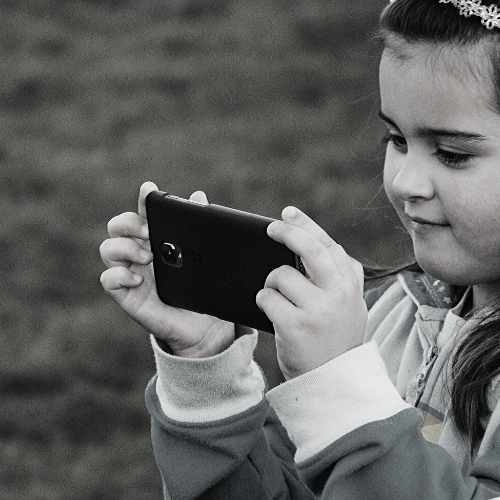Like many parenting questions, how much screen time, if any,
is safe for your children is one where you can get a different answer in every
article you look at.
This is partly because studying the effects of screens on children, particularly cell phones and tablets, is new. The evidence is still being collected. But don’t dismay. We’ve scoured the internet and found the best information out there on how much screen time is considered safe for your kids, from health organizations to recent news coverage and even the bulletin boards. Did we miss something? Let us know at [email protected].
THE CORONAVIRUS UPDATE
Parenting during a global pandemic has changed…so much. Countless words have been written on the topic of screen time rules during coronavirus, ranging from “forget everything!” to “you are ruining your kids in ways you didn’t even know”! We’ve got a run down on what is opinion, what is fact and what you need to know.
The biggest development comes from the American Academy of Pediatrics, which straight up acknowledged that screen time use would “likely increase.” They updated their recommendations by removing a hard time limit on screen time and instead emphasized what your kids is doing on the screen (i.e. watching a class, facetiming with family, or watching unending Peppa videos.)
But overall, the pandemic seems to have accelerated the message we flagged as coming through earlier – it is less about the total amount of time your kid spends looking at a screen (30 minutes versus 6o minutes is, for example, an arbitrary difference) and far more about what they are looking at.
Here’s what some experts said on the topic:
· Jenny Radesky, a pediatrician who helped write the updated AAP guidance: “We are trying to prevent parents from feeling like they are not meeting some sort of standard. …There is no science behind this right now. If you are looking for specific time limits, then I would say: Don’t be on it all day.”
Radesky recommended paying more attention to the “three C’s”: what your child needs, whether the content is educational/high quality/informative, and what the context of the situation is.
· Michael Robb, director of research for Common Sense Media, a family media advocacy group: “For a while now, media researchers have been advocating for a shift from screen quantity to content quality. …Worried that the online classroom is adding to your kid’s screen time? Don’t be. Screen activities shouldn’t be lumped together. Some are educational; some are just for fun. Some are high-quality; some are a guilty pleasure. What we do on screens and how we do it is more important than time spent.”
· Elizabeth Englander, professor of psychology and director of the Massachusetts Aggression Reduction Center: “Carve out non-screen time and let children know about upcoming changes in the schedule… Also, don’t be afraid to kill the internet if you don’t think the kids can handle making the transition, so they understand the privilege is linked to responding well when it’s time to put the screens away.”
· Dmitri Christakis, director of the Center for Child Health, Behavior and Development and a pediatrician who helped write the AAP recommendations: “I used to joke that the guidelines don’t apply to plane trips — except now it’s not an hours-long transatlantic flight, but a six to eight week one.”
And at least one survey of just over 1,000 parents in the United States found that while 77% said they had rules about “the use of technology” in February, by April a nearly identical number, 76%, said they “have suspended those rules and done away with limits on screen time.”
IF YOU READ ONE THING (A.K.A. THE TLDR)
The previous recommendations
from the American Academy of Pediatrics (AAP) were issued in October 2016 and are
summarized below:
- Kids under 18 months shouldn’t be looking at
screens EXCEPT for video chatting - Kids 2 to 5 years old should be limited to one
hour per day, and that should be “high quality” programming (Sesame Street
always gets a shout out from the docs on this point.) - Kids age 6 and up don’t have an explicit time
recommendation, instead they urge parents to set consistent limits and make
sure it doesn’t take over or replace other important parts of life, like
sleeping.
The Word Health Organization issued their own recommendations
in 2019, the major difference between theirs and the AAP is recommending no
screen time at all for children under 1. But as we explain below that
recommendation was not driven by evidence that screens are harmful for children
under one, rather, it was to promote activities where children are not
sedentary.
BUT SOMEONE SENT ME AN ARTICLE WITH A SCARY HEADLINE!
The scary headlines are out there, but here’s a run-down of
the best articles we found over the past two years. In our opinion, none
warrant the idea that you’re “doing it all wrong.” If we are missing a story,
let us know.
USA
TODAY, January 2020: Covers research that recently came out in
medical journal that toddlers and young kids who spend more than three hours
a day viewing a screen (phone/table and/or television) are more likely to be
“sedentary” by the time they are 5. Three hours is far than the one hour
recommended by pediatricians.
NYT, January 2020: Covers research from two psychology professors who went through 40 studies to examine the link between social media and depression in adolescents. What they found goes against the grain: the link between the two is “small and inconsistent.” They argue that previous studies have simply found a correlation between an increase in mental health issues and smart phones, but “if you compare the effects of your phone to eating properly or sleeping or smoking, it’s not even close.”
ABC
News, November 2019: Covers a study in JAMA Pediatrics that shows
brain structure “might be altered” with more screen use. The study was small,
including just 47 preschoolers.
NIH,
November 2019: This study foundthatthe kids’ average daily
time spent watching television or using a computer or mobile device increased
from 53 minutes at age 12 months to more than 150 minutes at 3 years.
USA
Today, October 2019: Covered a study in JAMA Pediatrics that
found television viewing, followed by video games, were most tied to poor
school performance. Other screen time didn’t have any “clear indication” they
were hurting kids at school.
NYT,
April 2019: Covers new recommendations from the World Health Organization
that says no screens for kids under one, no more than one hour for kids age 2
to 4. It quotes a pediatrician who helped write the AAP guidelines that their
group is “beginning to contemplate” the next set of guidelines.
The
Verge, April 2019: Explains how the WHO recommendations are not
based on “what screen time can do to the brain,” and quoted a WHO researcher as
saying the organization “didn’t specifically look for evidence about the
effects of screens…we were specifically looking at sedentary behavior.” In
other words, it’s not that screen time does something bad, its that it keeps
kids from moving around.
THE OFFICIAL WORD.
If you want to delve deeper in the AAP or WHO
recommendations, links are below. We’ve also included some tips that we thought
were helpful from the AAP in 2018.
- AAP recommendations from 2016: New
Recommendations for Children’s Media Use, accompanying
Pediatrics journal article - WHO recommendations from 2019: To
grow up healthy, children need to sit less and play more - AAP
Tips: There are several they released in 2018, but the below are the ones
we found most helpful.
- Screen time shouldn’t always be alone time. Co-view,
co-play and co-engage with your children when they are using screens
– it encourages social interactions, bonding, and learning.
- Don’t use technology as an emotional pacifier. Media
can be very effective in keeping kids calm and quiet, but it should not be the
only way they learn to calm down. Children need to be taught how to identify
and handle strong emotions, come up with activities to manage boredom, or calm
down through breathing, talking about ways to solve the problem, and finding
other strategies for channeling emotions.
- It’s OK for your teen to be online. Online
relationships are part of typical adolescent development. Social media can
support teens as they explore and discover more about themselves and their place
in the grown-up world. Just be sure your teen is behaving appropriately in both
the real and online worlds.
- Screen time shouldn’t always be alone time. Co-view,
BREAKING FROM THE BULLETIN BOARDS.
Sometimes it just helps to know you are not alone, and to
hear first-hand how other parents handled the situation. We’ve scoured some of
the biggest online forums for parents and found a few perspectives we thought
were worth sharing.
“We were adamant about zero screen time (we didn’t even
watch TV ourselves if he was near) until about 1-2 months ago…when our [little
one] was about 18 months old — which coincided with me being about 5 months
pregnant and thus EXHAUSTED. He is a little behind for his age in speech,
so we thought avoiding screen-time was extra-important for him…but his speech
therapist of all people actually recommended we let him see a little bit of
“Baby Signing Times” TV-show on YouTube (even though we were teaching
him signs ourselves too).” – What
to Expect
“As a parent with a noticeable social disorder I’m actually
very PRO screen time, which the strict proviso that
(a) screen time must be a shared experience. I watch short
episodes of children’s series with my daughter and actively interact with her
based on what’s going on in the series (e.g. counting with the series or
mimicking movements), and sometimes put on catchy songs via YouTube to dance
with her to.
(b) screen time is kept in a healthy balance with other
activities such as outdoor exercise, reading from real books or games (e.g.
chase).
I actually actively avoid leaving my daughter alone in front
of the TV. If I need to leave her occupied I can find other ways to do this.” –
Reddit
“My son watches a lot of TV most days (though he does go
days without it, we do lots of outside the house activities and go to parks
etc) but he’s EXTREMELY active for most of the day so the ratio ends up being
fine for me. We both appreciate the down time his favorite TV shows provide. I
just try and limit the kinds of shows he watches. Nothing with bad attitudes,
or too mature or violent for him (although he does enjoy watching Pokémon
reruns on Netflix with his nerdy parents).” – What
to Expect
“The toddler wasn’t even interested in screen time until
19-20m, when grandma gave him access to YouTube Kids… now he wants it almost
anytime we are home, watches baby songs and color/shape videos. Frankly I have
had to make my peace with it, because sometimes it’s a huge help in buying us
some peace and quiet for the baby’s sake, and ours… But we do spend lots of
time doing non-tv stuff.
Our baby could care less, he wants to interact with me lots,
and fusses until I pick him up to play, sing, bounce and cuddle. I don’t think
the bit of screen time he gets is going to be any kind of detriment, given how
we are constantly engaging with him as we should.” – Reddit
“Meh for what it is worth my 14 month old still isn’t
talking and I have knocked all the recommendations out of the park. No screen
time, talk constantly both to her and others (that 35k word goal is probably
met a lot of days in my house), I read well over an hour each day to her etc…
etc… She uses a lot of sounds and understands A TON of things…but not
really close to talking normally yet.
My neighbors kid and my nieces who allow unlimited screen
time seem to be having an easier time with their kid talking. Some days it
makes me want to cry, because I wonder why the hell I didn’t take the much
easier route.” – Reddit



